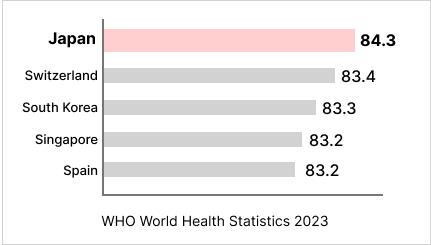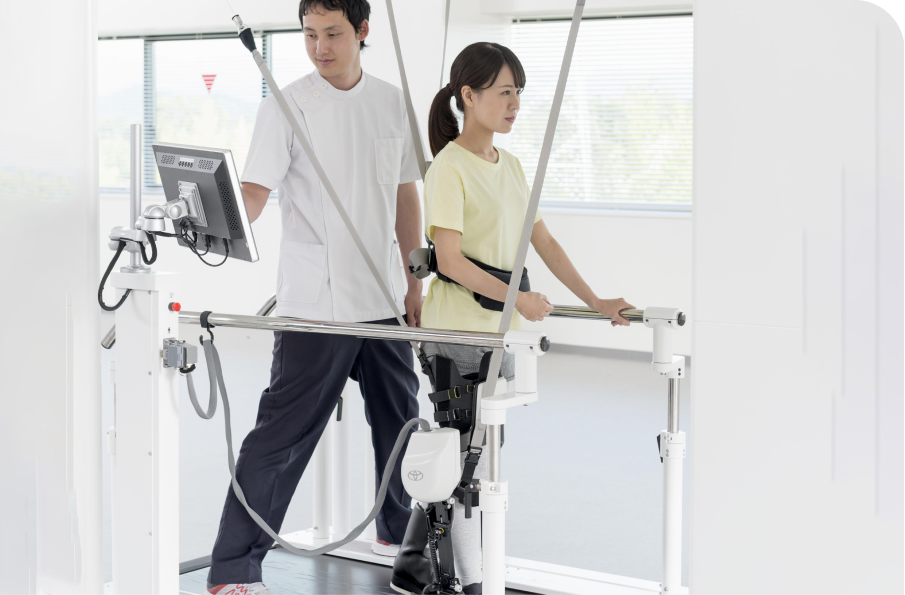
World-leading average life expectancy of 84.3 years
The average life expectancy in Japan is 84.3 years, the longest in the world (81.5 years for men, 85.6 years for women). High medical standards and healthy habits are probably the supporting factors.
Medical care in Japan
Japan's long life expectancy is supported by its highly regarded medical care. Want to get a health checkup or advanced medical treatment in Japan? Sure, some hospitals are open to foreigners!
-
Particle beam therapy

No.1in the world
(Number of treatment facilities and number of cases)
-
Thoracic cavity/Laparoscopic surgery,Robot-assisted surgery

97.7%
(5-year survival rate for stage 1 gastric cancer)
-
Endoscopy/Treatment

99.1%
(5-year survival rate for stage 1 colorectal cancer)
Top notch medical care and advanced technology
Hospitals in Japan provide high-quality and safe medical care to both domestic and foreign patients. The quality of such hospitals is ensured by external audits such as the Japan Medical Evaluation Organization and the JCI.
Patients have access to the latest and most advanced treatments.
-Minimally invasive surgery such as robotic surgery, endoscopic surgery and laparoscopic surgery.
-Particle beam radiation therapy, which is used to treat difficult-to-treat cancers such as head and neck cancer.
-Advanced treatments such as gene therapy and regenerative medicine using IPS cells and stem cells.
Excellent cost performance and accessibility
Treatment costs in Japan may be higher than in neighboring Asian countries, but are generally lower than in European countries and the United States. (Coronary artery bypass surgery: $100,000 in the U.S., approximately $60,000 to $90,000 in Japan). Clinics and hospitals are located throughout the country, and foreign patients can choose facilities based on location, medical needs, and budget.
Quality and safety backed by rigorous standards
Japanese medical facilities meet the medical safety and infection control guidelines regulated by the Japanese Ministry of Health, Labor and Welfare. Most hospitals that accept foreign patients are accredited by the JCI and the Japan Healthcare Organization.
Comprehensive medical checkups and preventive approach
Japan is where the concept of comprehensive medical check-ups originated. The entire body is thoroughly examined to detect early signs of diseases such as cancer and lifestyle-related diseases (cerebrovascular disease, cardiovascular disease, diabetes, liver disease, etc.). In addition to standard tests such as blood tests, X-rays, endoscopy, ultrasound, mammography and electrocardiograms, CT, MRI, PET and biomarker tests can be performed in well-equipped hospitals. Here, 45% of cancers are diagnosed at the localized stage, which leads to early treatment. In cancer, early detection is crucial as the 5-year survival rate for localized cancer is as high as 92.4%. Screening is followed by dietary and lifestyle recommendations. Clinics equipped with advanced testing equipment and staffed by excellent physicians and other medical professionals are located throughout Japan. Visitors can combine a checkup with their sightseeing destinations and choose from a variety of health checkup options, price ranges and goals.


Rehabilitation enabling recovery and reintegration
Rehabilitation is always provided after a major illness, such as cerebrovascular disease or trauma, in order to restore maximum physical function. Our world-class rehabilitation system provides optimal, customized training for each patient at each stage. Medical professionals work together as a team to support each patient's goal.
Diet recommended by physicians and registered dietitians
Dietary habits are a critical part of preventive care. Registered dietitians provide advice on eating habits based on the results of screening tests. Meals in hospitals are supervised by registered dietitians.
Appropriate meals for the medical condition are selected from a wide range based on the doctor's recommendations.
Tourist destinations and transportation
Full of rich culture and amazing sights, Japan is known for its safety and cleanliness (ranked first in the World Economic Forum's Travel & Tourism Development Index for 2021).Trains, bullet trains and buses are on time, and taxis are reliable and safe, providing tourists with efficient and comfortable transportation.
Q&AFrequently Asked Questions
- How can I find a hospital as a foreign patient?
- MEJ certifies hospitals that proactively accept foreign patients with proven records and high-quality medical services as Japan International Hospitals. (For more information, please visit http://www.japanhospitalsearch.org/search/)
- How do I make an appointment?
- Most hospitals accept patients through affiliated travel assistance companies that provide comprehensive support; medical visas, interpreters, additional accommodations, and transportation.
- How should I pay for medical expenses?
- Payment methods vary from facility to facility. In many cases, a deposit is required to the travel assistance company. In some facilities, payment for smaller amounts can be made at the facility by cash or credit card.

AboutAbout Japan International Hospitals
Japan International Hospitals (JIH) system is an initiative to provide the information useful to international patients on hospitals in Japan where they may receive medical services, and information on travel assistances to help them. Medical Excellence JAPAN (MEJ) assesses a hospital from aspects of not only the quality and safety of medical services, but also system and efforts of hospital to accept international patients, and then recommends the hospital that has met the criteria. MEJ also provides the list of recommended hospitals and the information on their medical services.

